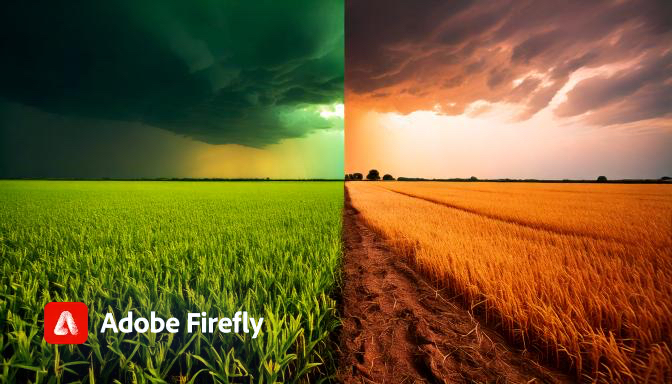Agriculture, a cornerstone of the U.S. economy and livelihood, faces mounting challenges as climate change disrupts its foundation. With over half of U.S. land devoted to farming and the sector contributing $1.53 trillion to the GDP, the stakes are high. Yet, rising temperatures, erratic weather patterns, and resource depletion are reshaping how we grow food and sustain rural communities.
ENVIRONMENTAL IMPACTS ON AGRICULTURE
The impacts of climate change are both severe and far-reaching. Heavy rains erode soil and deplete nutrients, while prolonged droughts in the Southwest, some of the worst in 1,200 years, threaten water availability. Wildfires destroy farmland and pollute air, compounding risks for people and ecosystems. Meanwhile, rising temperatures lower yields of staple crops like corn and rice, and heat stress reduces milk production and livestock productivity.
Water resources are equally strained. Runoff from intense rainfall contaminates nearby water bodies with fertilizers and pesticides, creating oxygen-depleted “dead zones” harmful to marine life. Coastal farms face erosion and saltwater intrusion due to sea level rise, endangering livelihoods and food security.
FOOD PRODUCTION AND GREENHOUSE GAS EMISSIONS
Agriculture also contributes significantly to climate change, with food production accounting for about a third of global greenhouse gas emissions. Methane from livestock digestion, nitrous oxide from fertilizers, and carbon dioxide from deforestation are major culprits. Animal-based foods like beef and shrimp are among the highest emitters, while plant-based diets—rich in fruits, vegetables, grains, and legumes—have a much smaller carbon footprint.
CHALLENGES FOR AGRICULTURE WORKERS
Farmers and agricultural workers bear the brunt of climate impacts. They face heat exposure, degraded air quality from wildfire smoke, and increased risks from pesticides as pests proliferate. Vulnerable groups, such as Indigenous communities and immigrant farmworkers, are disproportionately affected, highlighting issues of environmental justice and equity.
ADAPTING TO A CHANGING CLIMATE
Despite these challenges, innovative solutions offer hope. Farmers are adopting climate-smart practices like crop rotation, reduced pesticide use, and methane recovery from livestock waste. Shifting toward plant-based diets and alternative proteins, such as lab-grown meat and insect-based foods, could also reduce emissions. Reducing food waste is critical, as nearly 17% of global food is discarded annually, contributing to 8% of global emissions.
A PATH FORWARD
Addressing climate change in agriculture requires collaboration across all levels—farmers, policymakers, and consumers. Embracing sustainable farming practices, restoring degraded lands, and adopting plant-rich diets can significantly reduce emissions while preserving ecosystems. By rethinking how food is produced and consumed, we can mitigate climate risks and ensure a resilient, equitable food system for future generations.
THE FUTURE OF FOOD IS NOT JUST ABOUT FEEDING PEOPLE. IT´S ABOUT NOURISHING THE PLANET.




